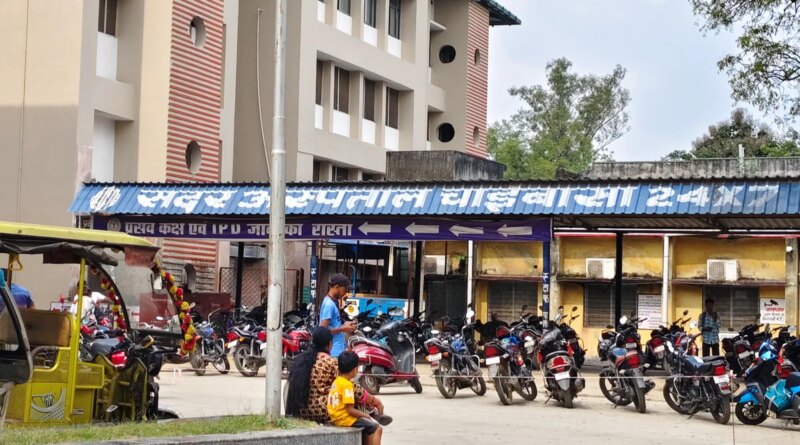EXCLUSIVE | HIV in 5 children getting thalassemia treatment: First case emerged month before Jharkhand officials made lapse public | India News
[ad_1]
The mother of one of the children, who was being treated for thalassemia and was infected with HIV, allegedly because of a blood transfusion in Jharkhand’s Chaibasa, has told The Indian Express that her child was diagnosed with the virus in September — a month before the administration officially confirmed the first case on October 18.
According to the child’s mother, hospital staff informed them in September that their child had tested positive for HIV and immediately began administering medicines, assuring them that “these would make the child recover”.
The child’s medical records accessed by The Indian Express show that antiretroviral (ART) treatment began on September 24, indicating that the child had been diagnosed with HIV weeks before the administration’s official announcement and raising questions on whether officials attempted to keep the case under wraps. A total of five children suffering from thalassemia have been diagnosed with HIV in the district.
“The hospital staff started behaving differently. They would ask others not to touch my child, which was disturbing me inside. That’s why I chose not to disclose this information to anyone. I hadn’t even heard of HIV before; someone informed me that it’s a serious illness,” the woman told The Indian Express.
She said she was neither informed about how the transmission may have occurred nor given any official explanation.
“I was only told to continue the medicines,” the mother said.
When contacted, Sushanto Majhee, the civil surgeon who has been suspended after the cases came to light, claimed that he was unaware of the situation and that he acted as soon as the initial case came to his attention. A call to the hospital’s current in-charge civil surgeon, Bharti Minz, went unanswered.
Story continues below this ad
Ajay Kumar Singh, additional chief secretary (health), said that the matter might not have reach the state level. “Usually, if any such complaint is raised or if something appears in the media, we immediately take cognisance. These are very sensitive cases; even the high court takes suo motu cognisance in such matters. In fact, a similar case from Ranchi jail was recently taken up by the high court,” he said.
He added that the case “was never flagged at the higher level”, and even if the then civil surgeon (who has now been suspended) was unaware of it, the responsibility seems to lie with the medical officers and technicians involved in the transfusion process. “There appears to have been a lack of sensitivity and negligence at their level,” Singh said.
Responding to allegations that mandatory processes such as basic donor verification and consent forms were skipped during blood donation, Singh said, “These are serious allegations and cannot be denied outright. There does appear to be negligence, and that is precisely why action has been initiated.”
On the action taken so far, he said, “All those involved, including contractual staff, have been removed. A team from the Union government also visited the site today. We will wait for the full report before commenting further.”
Story continues below this ad
He said the state government is “re-looking into the existing Standard Operating Procedures (SOPs) to identify if there were any loopholes”. Drawing a parallel with Covid testing, Singh explained, “Rapid kits can sometimes give false negatives just like how RT-PCR would confirm Covid when rapid tests failed. Positive means positive, but negative does not always mean negative. That’s why we have directed that the use of rapid kits be stopped immediately.”
Meanwhile, the parents of some HIV-positive children alleged that when they or their relatives donated blood for their children’s transfusion, the blood bank staff neither conducted prior testing nor asked them to fill the mandatory donor consent and screening forms.
According to the National AIDS Control Organisation (NACO) guidelines, every blood donation must be preceded by detailed donor registration, medical screening, and mandatory testing for HIV and other transfusion-transmissible infections before any unit of blood is accepted.
The parents further alleged that even after collecting blood from them, no documentation or post-donation follow-up was carried out by hospital authorities.
Story continues below this ad
One parent alleged he had donated blood for his child five times since treatment for thalassemia began – twice in 2023, twice in 2024, and once in 2025.
“They never checked my weight or took my blood samples for any test. They only asked about my blood group, and when I told them, they simply asked me to lie down on the bed and started taking my blood,” he alleged.
The father of another child claimed he had donated blood for his child twice about two years ago, but was never asked to go through the registration process. Asked if he might have forgotten filling out the form, he replied, “I don’t even know how to write. If I had gone through the process, I would have asked someone else to fill it for me. They just asked for my blood group and requested me to donate. If they conducted any tests after taking my blood, I’m not aware of it, but they didn’t even verify whether my blood group was the same as what I told them.”
Chaibasa Deputy Commissioner Chandan Kumar said it is not possible for a person to donate blood without registration. He said that since the families come from rural areas, the staff might have filled the forms on their behalf.
[ad_2]
Source link

